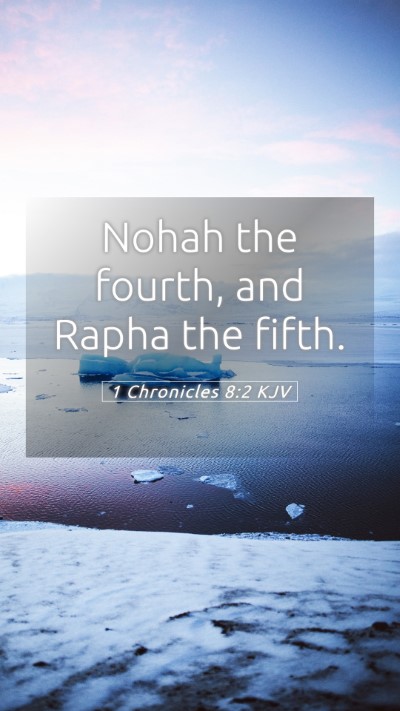Understanding 1 Chronicles 8:2
To grasp the meaning of Bible verses, it's important to analyze them within their historical context and consider the perspectives of different commentators. In the case of 1 Chronicles 8:2, we find a list of descendants and the lineage of the Tribe of Benjamin, which serves to trace the family trees of the Israelites. This verse provides insight into the genealogical records that were significant in ancient Israel, emphasizing the importance of heritage and tribal identity.
Overview of 1 Chronicles 8:2
The verse reads: "And the sons of Adaiah: Jeroham, and Laish, and these are the chief of the fathers of the inhabitants of Jerusalem" (1 Chronicles 8:2, KJV). This is part of a larger genealogy presented in the book of Chronicles, which focuses heavily on the lineages of the tribes.
Commentary Insights
Matthew Henry's Commentary
Matthew Henry emphasizes the significance of genealogies in the Old Testament, noting that they are not mere lists but serve as a foundation for understanding God's promises to His people. He points out that the identification of the chief fathers reveals their leadership role in Jerusalem, establishing their importance in historical and spiritual narratives.
Albert Barnes' Commentary
Albert Barnes adds that genealogical records like this verse are crucial in establishing the continuity of God's covenant with Israel. The mention of the 'chief fathers' signifies the authority and tribal connections within the community of Jerusalem, underscoring that every individual has a role in the divine narrative.
Adam Clarke's Commentary
Adam Clarke discusses the implications of this genealogy, noting that it offers a glimpse into the organizational structure of the Israelite society in Jerusalem. Clarke stresses that these records were important for the people of Israel for legal and social reasons, as they could trace their lineage back to the patriarchs.
Key Themes and Interpretations
- Tribal Identity: This verse highlights the importance of tribal affiliation, especially for the descendants of Benjamin, and serves as a reminder of the history and legacy of the tribe.
- Leadership and Authority: By mentioning the 'chief of the fathers,' the verse reflects the social structure within Jerusalem and indicates who held authority and responsibility.
- Connection to Promise: The genealogical lists throughout 1 Chronicles connect to God's promises made to the forefathers, showing His faithfulness through generations.
- Cultural Heritage: This commentary suggests an understanding of Scripture that values the cultural backdrop of the Israelites, as these records played a crucial role in their identity.
Applications for Today's Readers
Understanding 1 Chronicles 8:2 offers valuable lessons for modern readers regarding family, heritage, and identity. Here are some applications:
- Value of Heritage: Recognizing and appreciating one's ancestry can foster a deeper sense of belonging and identity.
- Leadership in Community: Understanding the roles and responsibilities of leaders is important in maintaining a healthy community, mirroring the importance placed on the chief fathers in the verse.
- Community and Responsibility: Just as the Israelites had a sense of continuity, individuals today can learn about the importance of being responsible for their own contributions to their communities.
Cross References
This verse is related to several other passages that offer further insight into the genealogical context:
- Genesis 49:10: Discusses the royal lineage of Judah, paralleling the importance of tribal identity.
- Nehemiah 11:4: Provides a list of inhabitants of Jerusalem, highlighting the significance of individual families.
- 1 Chronicles 7:6-12: Further discusses the descendants of Benjamin and their roles in Israel’s history.
Conclusion
In conclusion, 1 Chronicles 8:2 serves as a critical reminder of the rich history and the importance of genealogical records in ancient Israel. Through the combined insights from public domain commentaries, we gain a deeper understanding of Scripture, revealing themes of identity, leadership, and God's faithfulness across generations. This reinforces the relevance of genealogy in grasping the broader narrative of the Bible and provides a profound example for Bible study groups, online Bible study, and individual Bible study resources.


